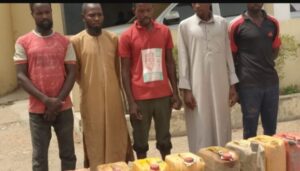“Within the traditional council, we have carefully studied the policy thrusts of Governor Bala Muhammed of Bauchi State towards poverty eradication. We are convinced that his policies are tailored to the economic viability of the state. His stewardship is adding credence to his policies”………..District Head of Giade
Poverty has been one of the forces militating against the socio-economic development of Nigeria and a threat to national security overtime.
The level of poverty in Nigeria is astronomically potent and politically embarrassing, considering the enormous human and mineral resources the country is endowed with.
Despite the huge resources successive governments committed to alleviate or eradicate the scourge of poverty, it appears there is no light at the end of the tunnel and no government at the centre seems battle ready to tame the monster. Instead, poverty is supported through corrupt practices and maladministration to thrive and consume the country.
Several commentators have advanced arguments against the rising rate of poverty in Nigeria that is partly responsible for the security challenges bedeviling the country today.
Nigerians have no reason to be poor if its endowed abundant human and natural resources including oil and gas are properly harnessed and channeled to development. For the sake of this discourse, Nigeria within 20 years after the civil war, 1970-1990, from crude oil sales, it realized $300billion. In 2003 alone, it realized $998.4billion from same crude oil sales, yet, there is nothing tangible to justify the expenditure of those humongous amounts that could have laid a solid socio-economic foundation for the country. Majority of public hospitals are in shambles, education has been bastardized and reduced to rabbles. Privately-owned schools have taken over the provision of so called quality education from public schools at cut-throat fees due to artificially created failure of public schools that have transformed to breeding centres of hoodlums.
Instead of a reliable socio-economic foundation, what we have is a failed system of governance carefully managed by undertakers. There is high level of poverty in the land, especially with incessant power failure which has chased so many business concerns to close shop. With power failure and high prices of petroleum products, small and medium scale businesses that usually reduce the number of unemployed have to either negotiate with power suppliers for power rationing, source power supply from private generators or quit the scene entirely.
Over the years, various governments made attempts to reduce poverty and boost the economy especially empowering the low class and those in the rural areas, but most of the efforts put-in-place, were infested by corruption. Had those programmes succeeded, the rate of poverty in the land could have reduced drastically compared with what we have today. Businesses could have boomed and flourish. There could not have been any need for Nigeria to be importing food and other agricultural products from other climes.
For instance, in 1981 or thereabout, the first civilian governor of Bauchi State, Tatari Ali, deemed it imperative to lay a solid economic foundation for the state to rely upon. He established Zaki flour mill, Misau ceramic industry, Gubi Dairy farm, Galambi cattle ranch and Madangala sheep ranch. The two ranches were established as sources of raw materials to the famous Bauchi meat canning factory that was established in 1964 by the defunct Northern Nigeria Government.
Mismanagement and sharp corrupt practices were the causes of the dearth of the once vibrant investments. Successive governments ignored the viability of those investments. It is now The Bala Muhammed administration that is battling the odds to resuscitate those investments for the good of the state.
In the 1970s, there was renewed effort in what was called rural development. The main idea was actually, a desperate effort to ensure adequate food supply for the country, especially to the parasitic urbanites. The efforts really served the needs of the cities through which the best and the choicest food produced were carted away by the middle men who bought at ridiculously low prices from the peasant farmers. The policy in practice, and implementation was exploitative and impoverished the rural areas because they were aimed at enhancement of food and crop production only. Billions of naira were expended on claimed rural development projects, yet the conditions of the rural inhabitants continue to worsen, abject and pitiable or miserable. This is because the projects were aimed at developing the rural people, and where they happened to contribute to the development, such contributions were secondary and distant. However, government of various regimes employed some strategies aimed at developing the rural areas in Nigeria.
The National Accelerated Food Production Project (NAFPP) was one of such strategies. The earliest effort at poverty alleviation was made in 1972 by the Gen. Gowon administration when he established the NAFPP and the Nigeria Agricultural Co-operative Bank (NACB), which was to fund agriculture. The project was launched in 1973 and it continued until 1976 when it was replaced with the Operation Feed the Nation programme of the Murtala/Obasanjo government while NACB remained. It was an impact making agricultural strategy to increase food production in specific areas and sub-sectors of the agricultural economy. NAFPP relied heavily on the cooperative approach as well as on technical assistance for its envisaged success. The scheme was a well-conceived and guided change programme for rural development, especially in the area of food production but corruption murdered it.
It was in 1976 that Operation Feed the Nation was introduced which like the NAFPP was designed to encourage food production and food security in an economy that had become increasingly dependent on crude oil. A major highlight of the programme was the encouragement given to ill-prepared undergraduates to go to the rural areas to teach peasant farmers modern farming techniques. Many rated the OFN as an Operation meant to fool Nigerians rather than to feed them, because it yielded no positive result to the anticipated food security. Instead, huge amount of public funds went the drain with few kleptomaniacs smiling to the banks.
The goal of OFN was twofold: first, to increase food production capacity of the nation and to tackle nutritional challenges among the people; and secondly, to increase the engagement of youths in agriculture, facilitating knowledge sharing from institutions of higher learning to the sites of food production- the farmlands. The programme sought to increase local food production and thereby reduce imports. Citizens were encouraged to cultivate any empty plot of land within their reach. While it was hoped that the rural farmers will benefit tremendously from having students working together with them and introducing new techniques, the objectives for the youths, who were mostly third-fourth year undergraduates-were as spelt out in the policy documents.
Obasanjo exited power in 1979 and was succeeded by Shehu Shagari whose government introduced the Green Revolution Programme. The aim of the programme like others before it was primarily to provide more food for the teeming population. The hallmark of the programme was to curtail food importation and boost crop and fibre production. As a notable writer and social critic, Chinua Achebe, summed up the Green Revolution Programme, “it gave us more food for thought than food for the stomach”.
Rather than empower the poor by providing the basic facilities needed to boost agricultural production, the programme made the rich richer, and the poor, poorer. It produced overnight elitist ‘farmers’ who had no business with real farming and in fact knew nothing about farming. Serving and retired military officers, senior civil servants and top businessmen, women and politicians misused their powers and influence to secure acres of land accompanied with Certificates and Rights of Occupancy for themselves, their families and friends under the guise of establishing farms. The programme came to an abrupt end in 1983 when Gen. Muhammadu Buhari chased away the political maggots we had as leaders. Before then, Green Revolution had gulped over N3.2billion.
Gen. Buhari came to power in 1983 and hurriedly introduced his Back to (School) to Land programme with variations. It was meant to boost agricultural production. On the heels of the Buhari and Idiagbon programme, the Rivers State Governor, Commissioner of Police Fidelis Oyakhilome, identified the problem of food shortage in the country and in his state in particular and decided to address the problem.
Oyakhilome, who at that time considered food availability a critical factor, went a step further and established the School to Land agricultural programme in 1985.
The whole idea was to radically redress the alarming and rising cost of food bills among the people as he was mindful of the likelihood of food sufficiency in the state creating markets and attracting neighbors from nearby states.
However, after his exit from power, in the typical Nigerian fashion, the project fizzled out and died and buried by successive regime.
Of all the military leaders who ruled Nigeria, Gen. Babangida would, arguably, remain the only one who introduced the highest number of poverty alleviation programmes. His administration, in 1986, established the Peoples Bank of Nigeria (PBN) and empowered it to offer soft loans to prospective entrepreneurs without collaterals. Community Banks were encouraged to exist as adjuncts to the Peoples Bank and the PBN regulated their activities. Both financial institutions are now part of history. The Nigerian corruption factor murdered them in broad day light.
Then another drain pipe was established. It was The Directorate of Food, Roads and Rural Infrastructure (DFFRI). The agency was created in 1986 with a specific mandate to open up rural areas through massive construction of feeder roads and provision of basic amenities which will transform them into production centres for the national economy. The hinterland was to be opened and made more accessible so that farmers could transport their produce with ease to the markets at affordable rates, thereby reducing cost of food production and rural to urban migration.
However, the Air Commodore Larry Koinyan led programme succeeded more as a drain pipe and beautiful dream than achieving what it was established to achieve. Before it winded up, it gulped over N1.9billion that could have served a better purpose. There were strong allegations of diversion of public funds to private vaults and sudden emergence of new class of millionaires.
Then there was the National Agricultural Land Development Authority (NALDA). It was another programme that Gen. Babangida created in 1986 which targeted the agricultural sector and aimed at encouraging large scale commercial farming by supporting farmers with inputs and developing land for them to the point of planting, at subsidized rates. This was to reduce the prevalence of subsistence agriculture in the country. The usurpation of the privileges and rights of the under-privileged by the ‘mighty’ powerful, rich and strong, which has remained a typical Nigeria’s problem, reared its ugly head again. However the programme died prematurely but not until over N1billion was squandered on flamboyancy.
In desperate need for solution to poverty scourge, Structural Adjustment was established by Gen. Babangida which stressed greater need for the realization of policies and programmes to alleviate and provide safety nets for the poor. The programme failed because it lacked human face in implementation. Instead, it created additional poverty and hardship.
Babangida reluctantly vacated the seat of power as a disappointed military president through confusion of June 12 presidential election result annulment. He was ferried to his palatial palace in Minna suspected to have been erected with proceeds of crime where he remains licking the wounds of his misrule.
Then there was Family Economic Advancement Programme (FEAP). To prove that he too had a way out of the nation’s poverty, the late Sani Abacha, in 1993, introduced FEAP. The programme from the start was elitist and directionless without sincere intention for the good of Nigerians. It gulped over N7billion within two years but disbursed N3.3billion as ‘loans’ to about 21,000 cooperative societies that are yet to liquidate.
Part of the determined ‘war’ against poverty was the introduction of the National Poverty Eradication Programme (NAPEP) in 2001 by President Olusegun Obasanjo with the aim of wiping poverty from Nigerian space by 2010. The policy aimed at assuring Nigerians that unemployment, poor educational system, lack of portable water, poor power generation and supply, poor healthcare delivery, inadequate infrastructure and insecurity will be things of the past. With all those promises and accompanying funding, after several years of implementation, it appears the situation is not better than what it was before the advent of the democracy in 1999. What we unfortunately have is the rise in poverty and insecurity rate with few living above the poverty line but sleeping with the two eyes opened.
There is the general belief that one of the major reasons for the recorded failures of all the agricultural/poverty reduction programmes was that they were based on “faulty philosophies and sincerity of purpose”. The belief is that food programmes such as the Gowon’s National Accelerated Food Production Programme; the Obasanjo Operation Feed the Nation; the Shehu Shagari’s Green Revolution, and the Buhari’s Go Back to Land Programme “failed because of the far-fetched objectives of making farmers out of all Nigerians, and that no country attains self-sufficiency in food by seeking to turn all citizens into farmers, that farming should be left to those whose business it is to farm”.
Faced with the biting problem of poverty in the country by successive governments in the past, the federal government, under the present democratic dispensation should put-in-place policies and programmes to ameliorate the suffering of the people. Those policies should be initiated here and seek support from abroad including the United Nations, World Bank and the African Development Bank. In a bid to reduce poverty, the World Bank should assist Nigeria in the execution of certain projects. It is our hope that those policies if initiated holistically should not be kept in the archives by coming governments.
Muhammad is a commentator on national issues







